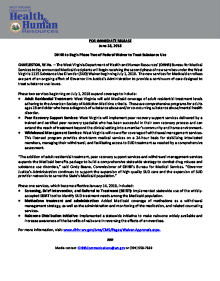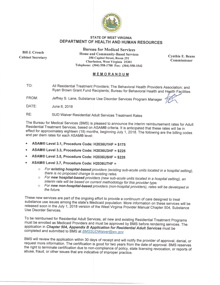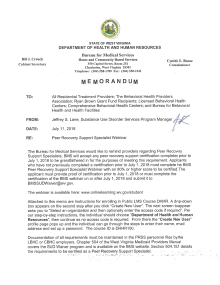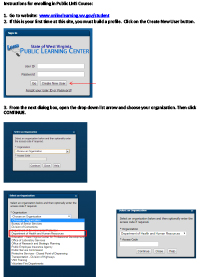Federal Waiver to Treat Substance Use
The West Virginia Department of Health and Human Resources’ (DHHR) Bureau for Medical Services has begun offering services under a Federal Waiver to treat Substance Use. Medicaid recipients will receive new services under the West Virginia 1115 Substance Use Disorder (SUD) Waiver. The new services for Medicaid enrollees are part of an ongoing effort of Governor Jim Justice’s Administration to provide a continuum of care designed to treat substance use issues.
Phase one services began on January 14, 2018, and included coverage of:
- Screening, Brief Intervention, and Referral to Treatment (SBIRT): West Virginia implemented statewide use of the widely-accepted SBIRT screening tool to identify SUD treatment needs among the Medicaid population.
- Methadone treatment and administration: The state added coverage of methadone as a withdrawal management strategy, as well as the administration and monitoring of the medication, and related counseling services.
- Naloxone Distribution Initiative: West Virginia designed and implemented a statewide initiative to make naloxone (Narcan®) widely available and increase awareness of the benefits of naloxone in reversing the effects of an overdose; and to provide information about local SUD services and the availability of treatment through the 1-844-HELP4WV helpline to members recovering from an overdose.
Phase two services began on July 1, 2018, and expanded coverage to include:
- Adult Residential Treatment: West Virginia added Medicaid coverage of adult residential treatment levels 3.1, 3.3, 3.5 and 3.7 adhering to the American Society of Addiction Medicine® criteria. These are comprehensive programs for adults ages 18 and older who have a diagnosis of substance abuse and/or co-occurring substance abuse/mental health disorder.
- Peer Recovery Support Services: West Virginia implemented peer recovery support services delivered by a trained and certified peer recovery specialist who has been successful in their own recovery process and can extend the reach of treatment beyond the clinical setting into a member’s community and home environment.
- Withdrawal Management Services: West Virginia will expand coverage of withdrawal management services. Short-term medical services are available for stabilizing intoxicated members, managing their withdrawal, and facilitating access to SUD treatment based on the member’s medical necessity as determined by a comprehensive assessment.
The addition of these services assists in expanding the Medicaid benefits package to build a comprehensive statewide strategy to combat drug misuse and substance use disorders.
For more information, visit: www.dhhr.wv.gov/bms/CMS/Pages/Waiver-Approvals.aspx.



